Lower School Curriculum
JK & Kindergarten
The Junior Kindergarten and Kindergarten classes emphasize hands-on and play-based learning.
Teachers work closely to plan projects that carry through a child's journey from Junior Kindergarten and on to Kindergarten. Our Kindergarten graduates leave prepared to take the next step in their educational journey.
In Junior Kindergarten, hands-on activities are key to engaging the students. This year emphasizes social interaction, where students learn to use their words, self-regulate, and listen to others.
In a language-rich environment, phonemic awareness, the basis for learning phonics, is introduced. Children begin to explore developmentally appropriate handwriting. Math is all about using hands-on manipulatives to explore mathematical concepts. Science encourages the students to observe, investigate, and inquire, building on a child's natural curiosity and developing critical thinking skills. After a year of learning plant life cycles, planting and nurturing seeds, and harvesting what they've grown, every student will earn their Junior Master Gardener certification.
Exposure to World Languages, Art, Music, and P.E. further broadens the children's horizons, fostering cultural appreciation, creative expression, rhythmic understanding, and physical well-being. Our Junior Kindergarteners find joy and valuable learning experiences in monthly excursions to local farms, the Air and Space Museum, nearby food and animal shelters, and more.
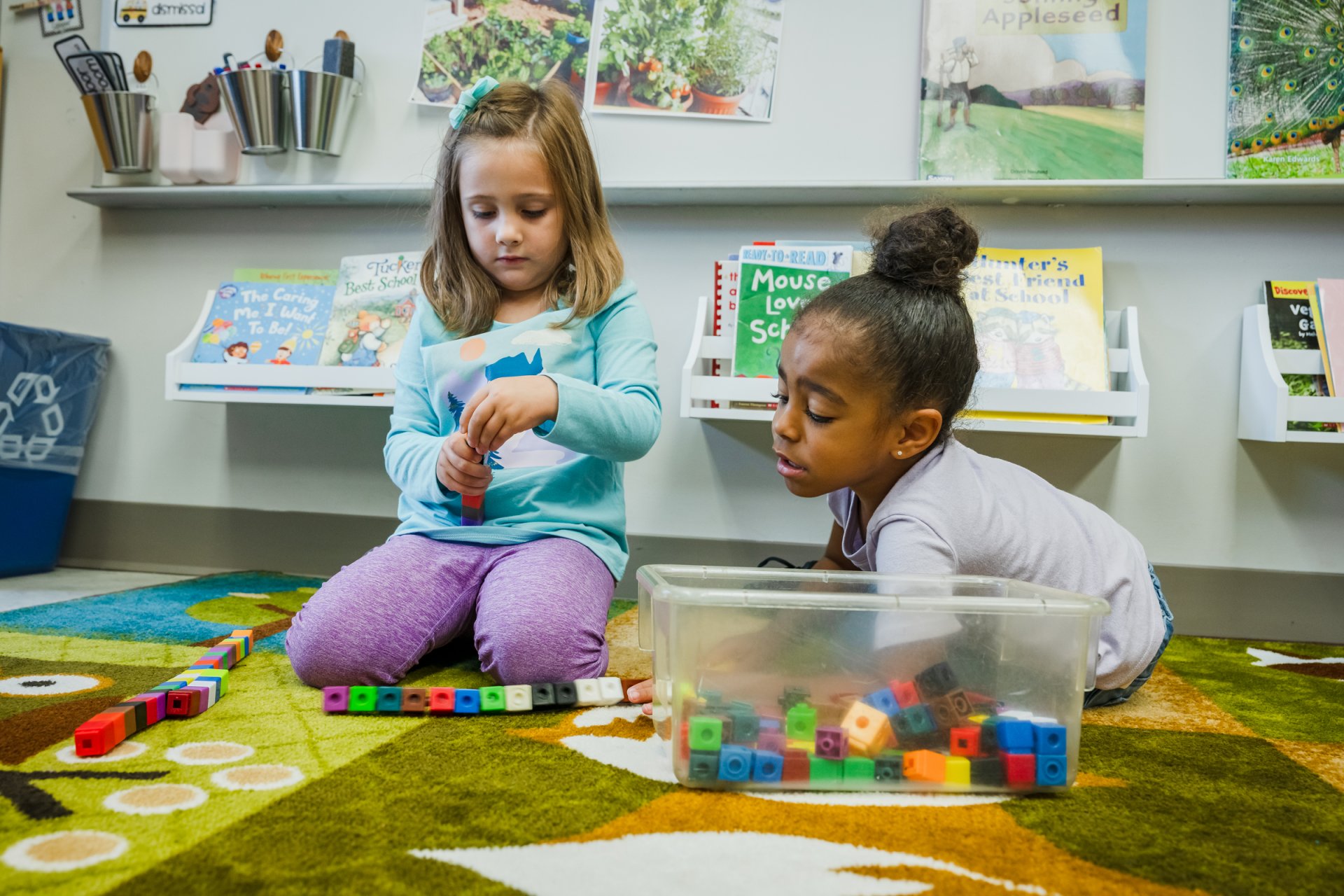
In Kindergarten, students practice social interaction with others, beginning each day with a morning meeting to hone these skills. Kindergarten students see an increase in group and independent work time, which encourages independence, a sense of accomplishment, and the ability to be part of a learning community. They are encouraged through open-ended activities to explore, take risks, make decisions, and grow their natural curiosity to explore.
Academically, they experience phonics decoding and encoding, guided reading, reading for meaning, and vocabulary activities, all in a literacy-rich environment.
In math, they begin linking the concrete to the abstract and are introduced to problem-solving and analyzing data. Science is experienced through plenty of time outdoors in all weather, doing experiments, and keeping journals –fostering cross-curricular connections in science, art, and writing. After a year of learning plant life cycles, planting and nurturing seeds, and harvesting what they've grown, every student will earn their Junior Master Gardener certification.
Exposure to World Languages, Art, Music, and P.E. further broadens the children's horizons, fostering cultural appreciation, creative expression, rhythmic understanding, and physical well-being. Our Kindergarteners find joy and valuable learning experiences in monthly excursions to local farms, The Kennedy Center, the Shenandoah Valley Discovery Museum, and more.
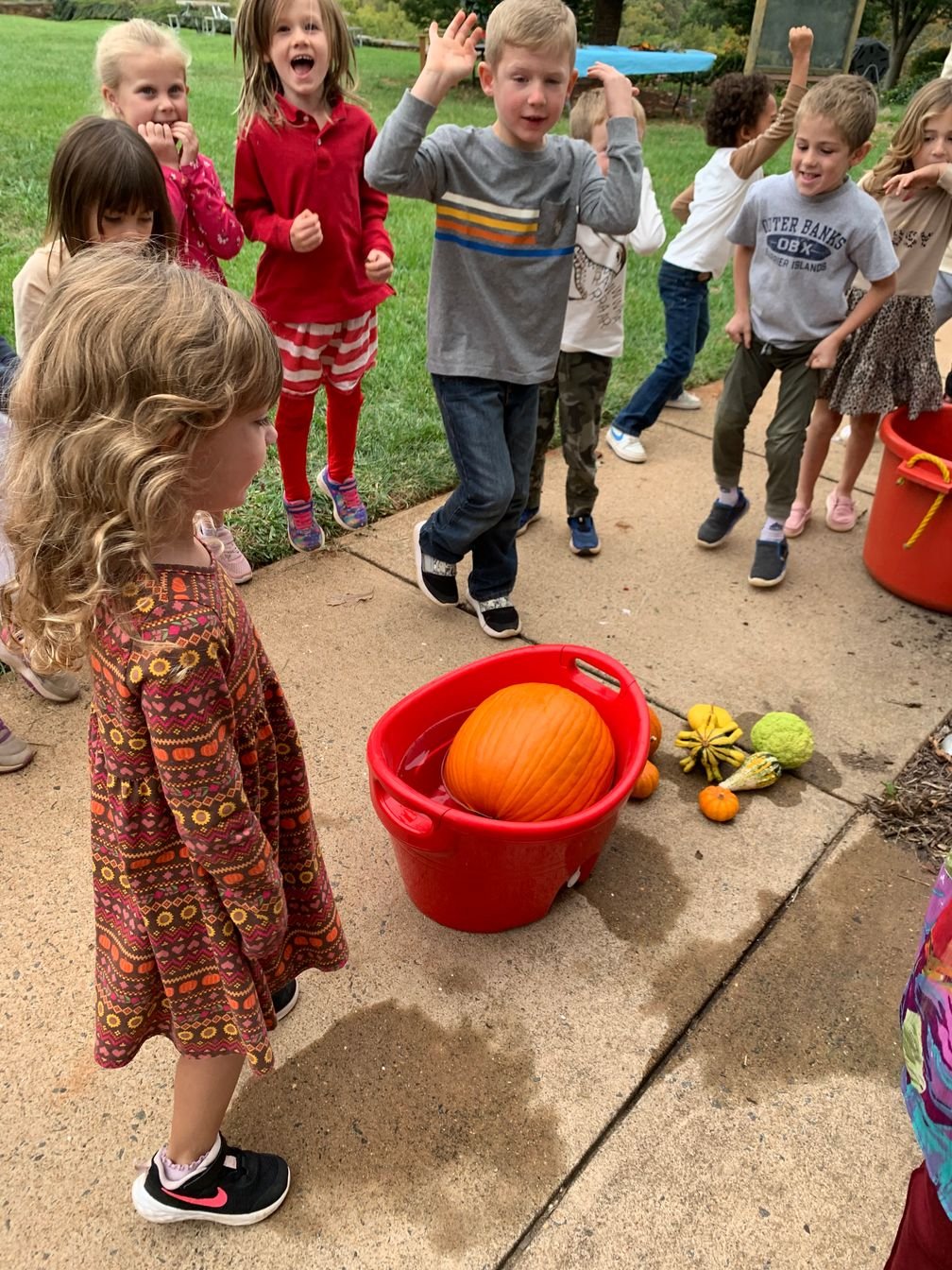
First – Third Grades
We are curious, we set and meet our own goals, and above all, we are passionate about learning and challenging ourselves to be the best we can be using our individual strengths.
This is an exciting year for students as oral reading, fluency, and comprehension skills are developed and expanded.
In first grade, students further develop reading, writing, speaking, and listening skills. Students read appropriately rigorous, high-quality texts that are the focus of their reading, writing, speaking and listening, and language practice. Effective writing strategies improve oral and written communication across various purposes and audiences.
Mathematics instruction emphasizes the continued development of addition and subtraction skills. Students deepen their understanding using math tools and manipulatives while writing and answering questions about how they solve problems and understand concepts. Data interpretation, measurement, and geometry concepts are explored.
Science studies cover plants, insects, and life cycles, with a focus on the butterfly's life cycle. Students learn about environments supporting plant and animal life, weather patterns, and the water cycle. Properties of solids, liquids, and gases are explored through hands-on activities and observations, including participation in the Jr. Master Gardener Program, STEAM Lab, and experiential learning trips.
Students begin to understand that life changes over time. Learning about national holidays, symbols, historical figures, and events provides an introduction to significant developments in US History. Students expand their understanding of citizenship, basic map skills, and economic concepts through projects such as the Family Tree, Timeline Project, and the American Hero presentation.
The World Language program introduces students to French and Spanish through interactive experiences to establish the foundation of their language skills. They begin to develop listening and speaking skills, facilitating communication in the target language. Cultural awareness is enhanced through celebrations, holidays, and lifestyle exploration in French and Spanish-speaking countries.
In the arts, students explore color, shapes, textures, and forms in their environment, using various media to express ideas and experiences. The music curriculum introduces basic musical concepts through singing, playing instruments, and responding to music, reinforcing these concepts in alignment with other subjects whenever possible.
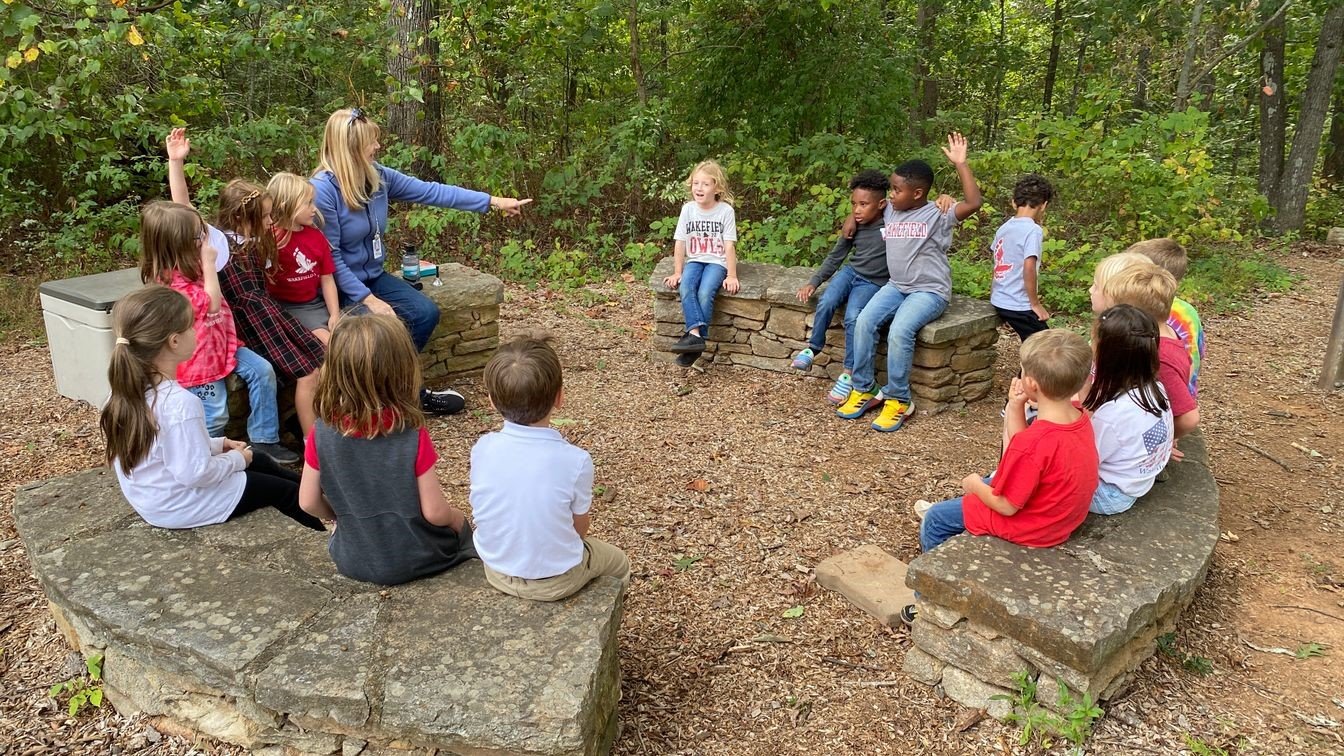
Second grade is a time when students begin to see themselves as scientists, mathematicians, citizens, writers, actors, engineers, historians, artists, and musicians because they are becoming more confident in their ability to rise to the learning challenges presented to them. They also learn the value of collaboration and different ways of thinking and being as they learn together.
Students are guided to see themselves as competent verbal and written communicators who can speak, listen, read, and write for a variety of purposes and audiences. Students develop greater reading fluency, comprehension, and expanding vocabularies. The study of phonics enhances reading accuracy and spelling, while strategies aligned with the Six-plus-One Traits improve oral and written communication.
Math engages students in hands-on problem-solving with manipulatives and opportunities to observe and develop an understanding of the relationship they see between numbers. Students learn to measure length, weight/mass, time, temperature, volume, and money, covering areas such as Numbers and Numeration, Operations and Computation, Data and Measurement, Geometry, and Algebraic Thinking.
Science exploration continues to encourage students to explore the world around them, using their senses for detailed observations and data collection. Through hands-on experimentation, they formulate questions, predict outcomes, and draw conclusions. Topics span earth and space, seasonal changes, plant life cycles, animal habitats and classification, states of matter, conservation of resources, and force and motion.
In Social Studies, second graders discuss and practice ways to be good citizens at home, in school, and in the community. Students take part in mock archaeological digs to learn how artifacts provide us with clues from the past to better understand prehistoric life. Students are introduced to American historical figures, holidays, and events, while deepening their knowledge of global and North American geography.
In World Languages, students expand their language skills through new commands, songs, stories, and games, enhancing listening, speaking, pronunciation, and reading abilities in Spanish and French. Students explore elements of Hispanic and French cultures, recognizing differences and similarities with the United States through celebrations and lifestyles.
In the Arts, students explore the use of colors, color mixing, and painting to express feelings and communicate ideas, while developing spatial awareness in their environment and artwork. Music emphasizes basic concepts through singing, reading music, and playing instruments, aligning with and complementing other subjects and projects whenever possible.
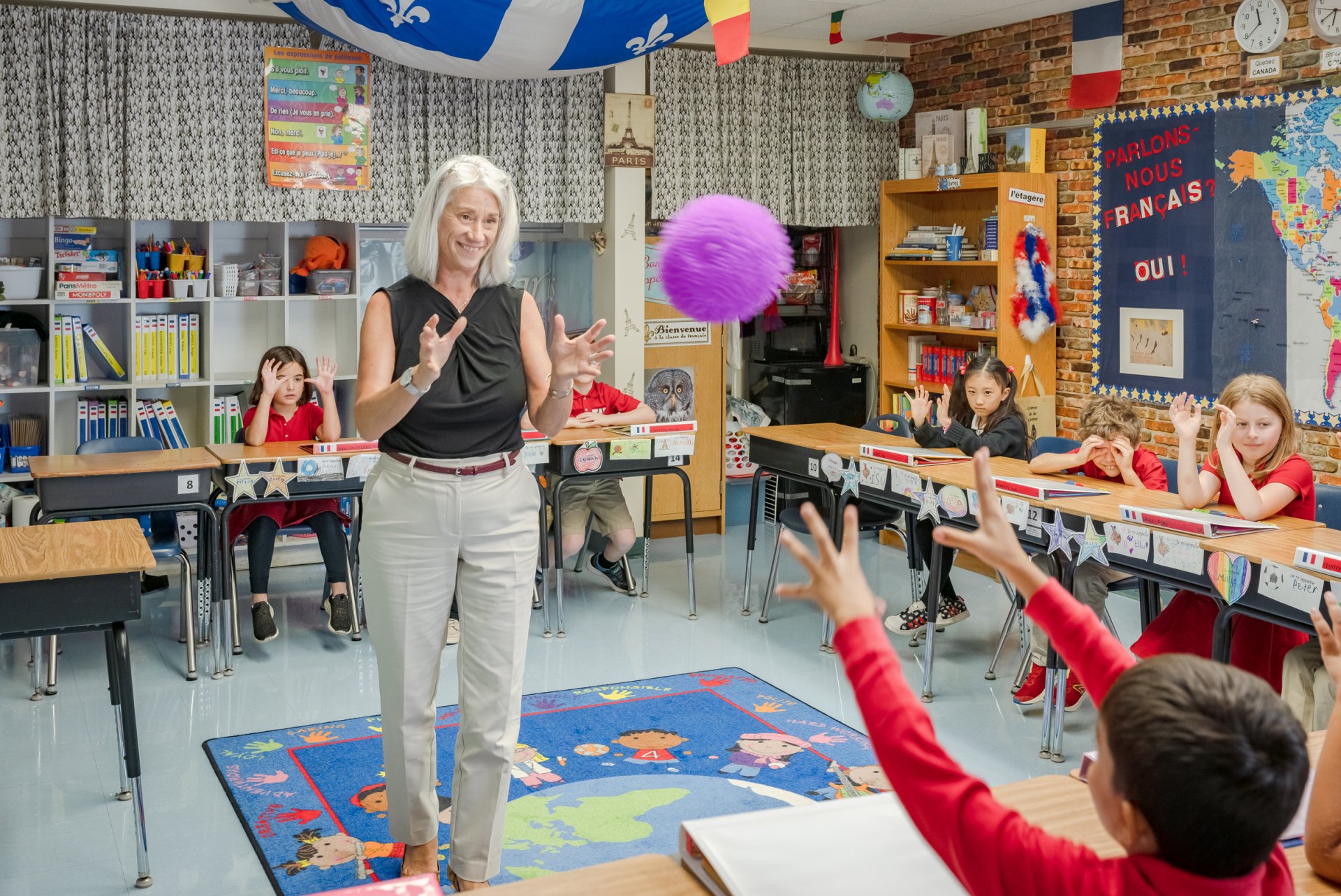
Knowledge abounds as we explore the ancient civilizations of Greece and Rome. Gods and goddesses, an Egyptian Banquet, and inductions into the Society of Twelves keep us busy this year.
In third grade, students engage with a broader range of non-fiction and fiction topics, exploring challenging themes that extend beyond personal experiences to encourage consideration of diverse perspectives. Emphasizing vocabulary acquisition, reading fluency, and comprehension, students refine communication skills through group activities and oral reports. They master sentence structure, punctuation, word choice, and parts of speech while planning, drafting, and editing stories and reports.
Students build a strong mathematical foundation by mastering fact families in addition, subtraction, multiplication, and division. With this knowledge, they tackle two-step word problems and equations, understand and compare fractions, explore perimeter and area, and interpret charts and graphs. Those who master multiplication facts are inducted into the Society of Twelves - an honored Wakefield rite of passage!
The third-grade science curriculum is STEM-based, covering Life Science, Earth Science, Physical Science, and Health Science. Students develop critical thinking skills through activities such as researching and creating models of ecosystems, using moon charts, identifying Earth's layers, distinguishing between landforms, and summarizing electromagnet applications.
Delving into ancient civilizations, students delight in exploring the Mediterranean's geography and the Minoan influence on Greek civilization. Researching gods, goddesses, and heroes, they enhance research and presentation skills. From the Fall of Rome to the Middle Ages, students uncover the Golden Age of Greece and Medieval Europe, tracing the roots of literature, art, and architecture. Connecting ancient structures to modern buildings and seeking Greek mythology in contemporary media, students unravel the enduring influence of past societies on our cultural, political, and philosophical landscapes.
World language exposure expands with the review and presentation of new commands, songs, stories, games, and authentic materials. Developing listening, speaking, and reading skills, students categorize and expand vocabulary. Students explore elements of Hispanic and French cultures, recognizing differences and similarities with the United States through celebrations and lifestyles.
In the Arts, students explore color use, mixing, and painting to express emotions and ideas, enhancing spatial awareness. Music emphasizes basic concepts through singing, reading, and playing instruments. The curriculum also integrates ensemble playing, musical form, composing, and listening to larger works, aligning with and complementing other subjects and projects whenever possible.
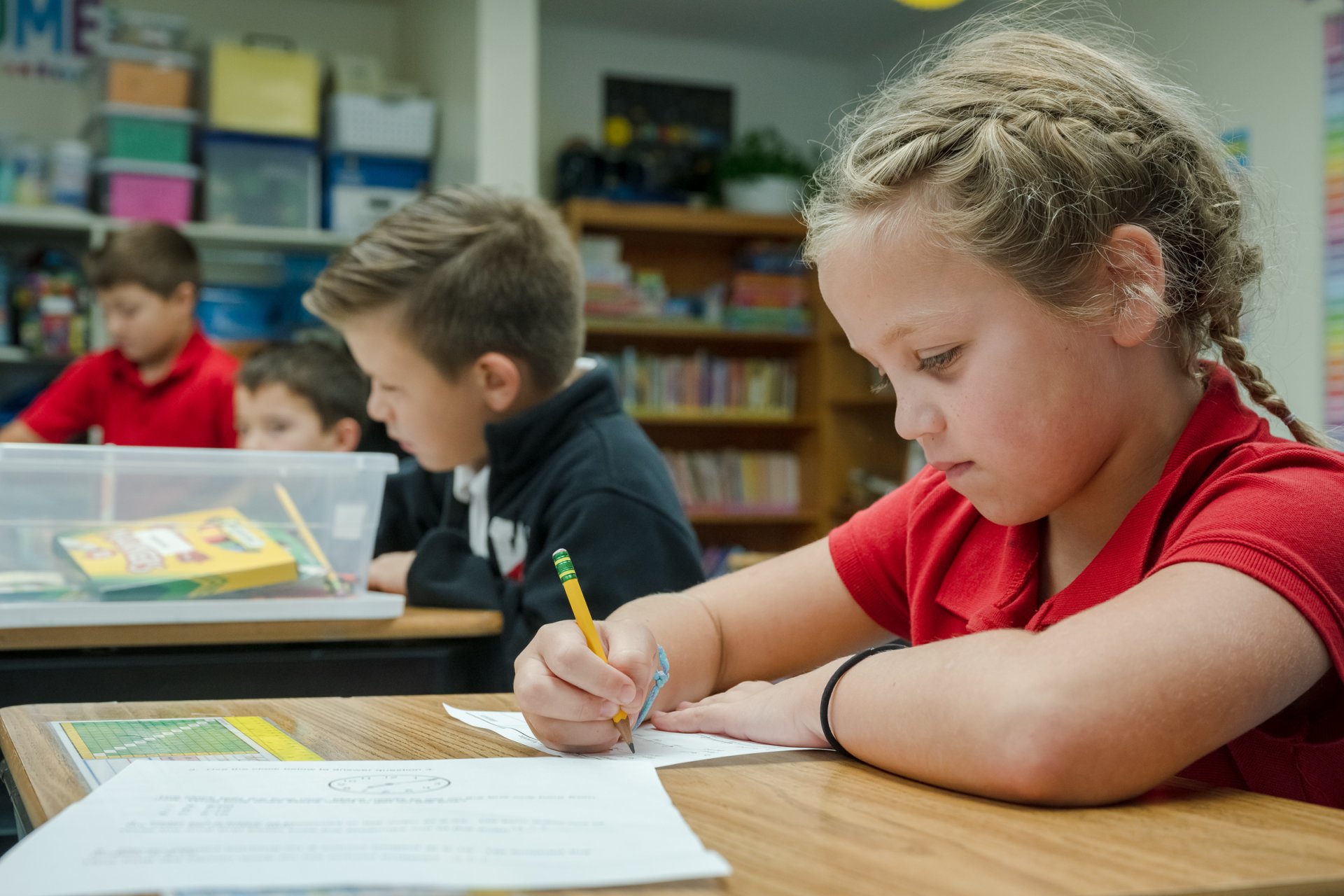
Fourth & Fifth Grades
Fourth and fifth grades mark the transitional years between Lower and Middle School, as students embrace more responsibility and leadership in the Lower School.
The move to subject-based classes replaces the homeroom structure, mirroring Middle and Upper School practices. Students learn computer literacy skills, acquire personalized Wakefield School email addresses, and master proper email etiquette during this transitional period, preparing them for the exciting journey ahead.
Fourth-grade Literature is designed to shepherd students through reading for enjoyment and reading to learn. The curriculum, comprised of reading, literature, and short-answer writing, encourages active and purposeful reading. Basic elements of literary analysis, such as plot, genre, theme, writing styles, and language use, are explored. Complex reading selections, writing responses, and directed discussions enhance critical thinking. A mix of novel and short story studies provides a diverse exploration of authors and genres.
In the fourth grade, students develop their own communication style, and basic grammar becomes essential for effective oral and written expression. Vocabulary lessons intertwine grammar and word study, promoting proper sentence structure and expressive communication. From basic sentences to paragraphs, compositions, research documents, and essays, students progress, exploring narrative, descriptive, expository, persuasive, explanatory, and poetic writing styles with ample opportunities for public speaking.
The Mathematics curriculum emphasizes multi-digit multiplication and division, conceptual understanding of fraction equivalence and comparison, and geometric figure analysis. Real-world problem-solving reinforces a strong foundation for mathematical thinking.
Fourth-grade Science is STEM-based, covering Earth Science, Astronomy, and Physical Science. Students are encouraged to question, explore their world, solve problems, and create and develop the critical thinking skills necessary to meet the challenges in their world today. Science thinking skills, observation, and documentation are emphasized, integrating reading for factual information, note-taking, and study skills while incorporating visual, auditory, and tactile activities.
In Social Studies, students explore early American history, discerning between reliable and unreliable sources. Topics include Native American peoples, European arrival, colonial life, slavery, the American Revolution, and the establishment of Constitutional democracy. The curriculum builds up to a cherished Wakefield tradition — the first overnight trip to Williamsburg, Yorktown, and Jamestown, where history comes alive for young historians.
World language exposure expands through various activities, enhancing listening, speaking, and reading skills. Students explore elements of Hispanic and French cultures, recognizing differences and similarities with the United States through celebrations and lifestyles.
In the Arts, fourth-grade students express feelings and ideas through colors, mixing, and painting. Spatial relationships, perspective, highlights, and shadows are emphasized, discussing historical works stylistically and contextually. Music instruction deepens comprehension through singing, playing instruments, listening, composing, and performing, aligning with other subjects whenever possible.
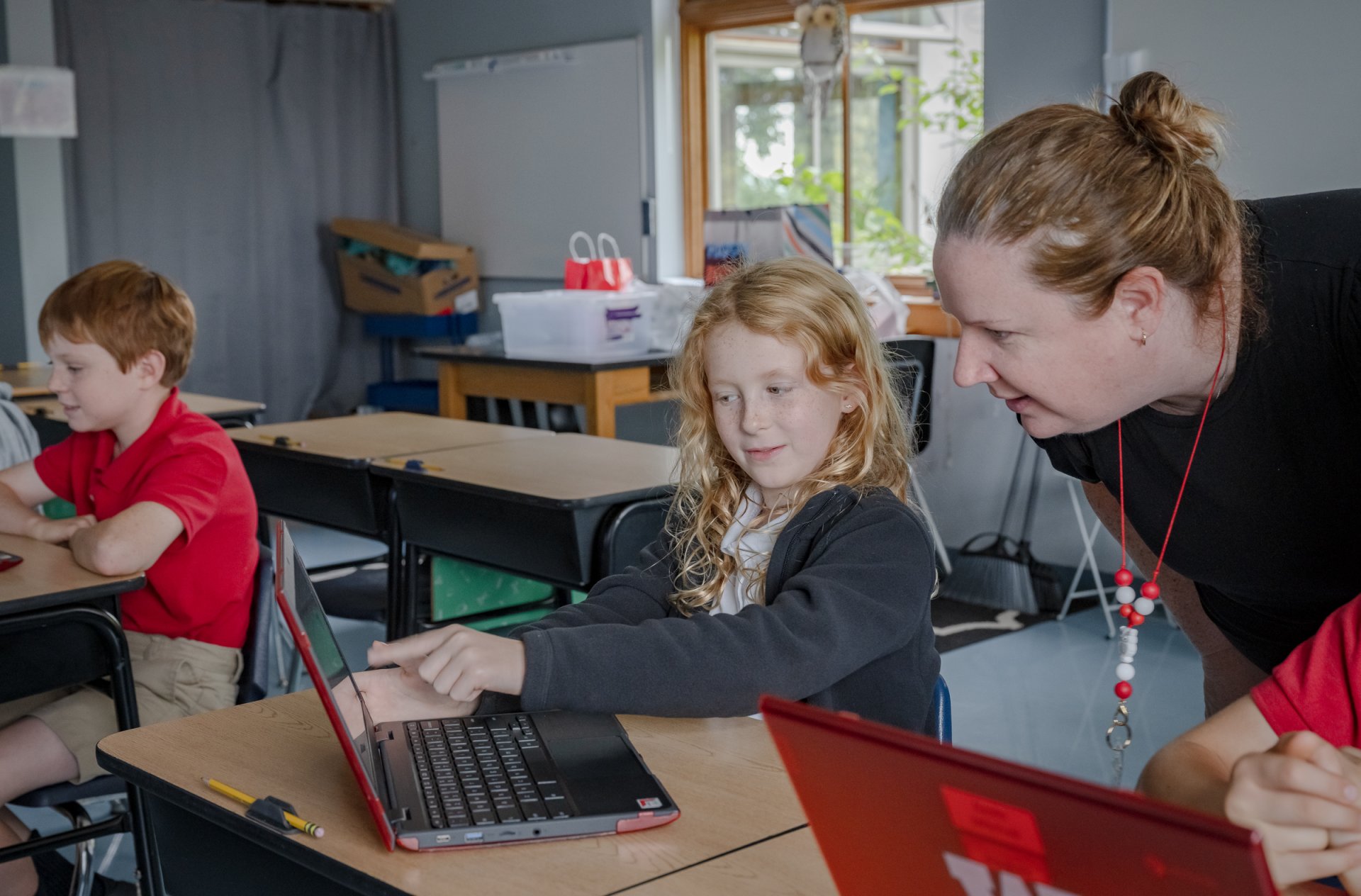
Our fifth-grade curriculum offers a dynamic and comprehensive educational journey that embraces interdisciplinary learning, where students apply knowledge gained from all subjects. It's an exciting year as fifth graders showcase their growth in responsibility by leading our Lower School assemblies, serving as our Honor Guard, and assisting their younger peers during drop-off and pick-up times.
In Literature, students navigate reading for enjoyment and for learning, exploring plot, genre, theme, writing styles, and language use. Engaging in discussions that span a variety of short stories and novel studies across multiple genres, students experience diverse exploration in literary analysis, further enhancing their critical thinking and analytical skills.
Composition aims for effective oral and written communication, covering parts of speech, sentence structure, and writing mechanics. Writing assignments progress from basic sentence construction to essays, narrative writing, persuasive writing, expository writing, and poetry. The curriculum encourages structured writing while allowing students the latitude to express, explain, and defend their opinions actively and collaboratively.
In Math, students master numeration of whole numbers, fractions, decimals, and graphing, applying formulas for perimeter, area, volume, and surface area. Geometry and variable equations are introduced.
Science is STEM-based, covering Life Science, Physical Science, Earth Science, and Space Science. Students ask questions, explore, solve problems, and create. The scientific method is applied through activities such as water, pH, and glucose testing and ecosystem observations with experiments covering various topics, from beach erosion prevention to Newton's laws of motion. The yearly Invention Convention is a fifth-grade tradition where students create task-performing inventions using all six simple machines. They document their process in a Science Journal, build a marketing strategy, craft a blueprint, and present both visually and orally to the community.
In History, we explore prehistory, the Fertile Crescent, Ancient Egypt, Nubia, India, China, and Ancient Greece. Geography studies include location, physical, cultural, political, and economic aspects. An interdisciplinary research project challenges students to choose a specific country to explore all aspects of its government, resources, population, religious beliefs, and culture.
World language exposure to French and Spanish expands through various activities, enhancing listening, speaking, and reading skills. Fifth-graders eagerly await the French and Spanish market– an annual lively event where they indulge in an immersive cultural experience, practicing their language skills to select and bring home authentic goods.
In the Arts, students express themselves through colors, mixing, and painting, emphasizing spatial relationships, perspective, highlights, and shadows. Music instruction deepens comprehension through singing, playing instruments, listening, composing, and performing, aligning with other subjects whenever possible.
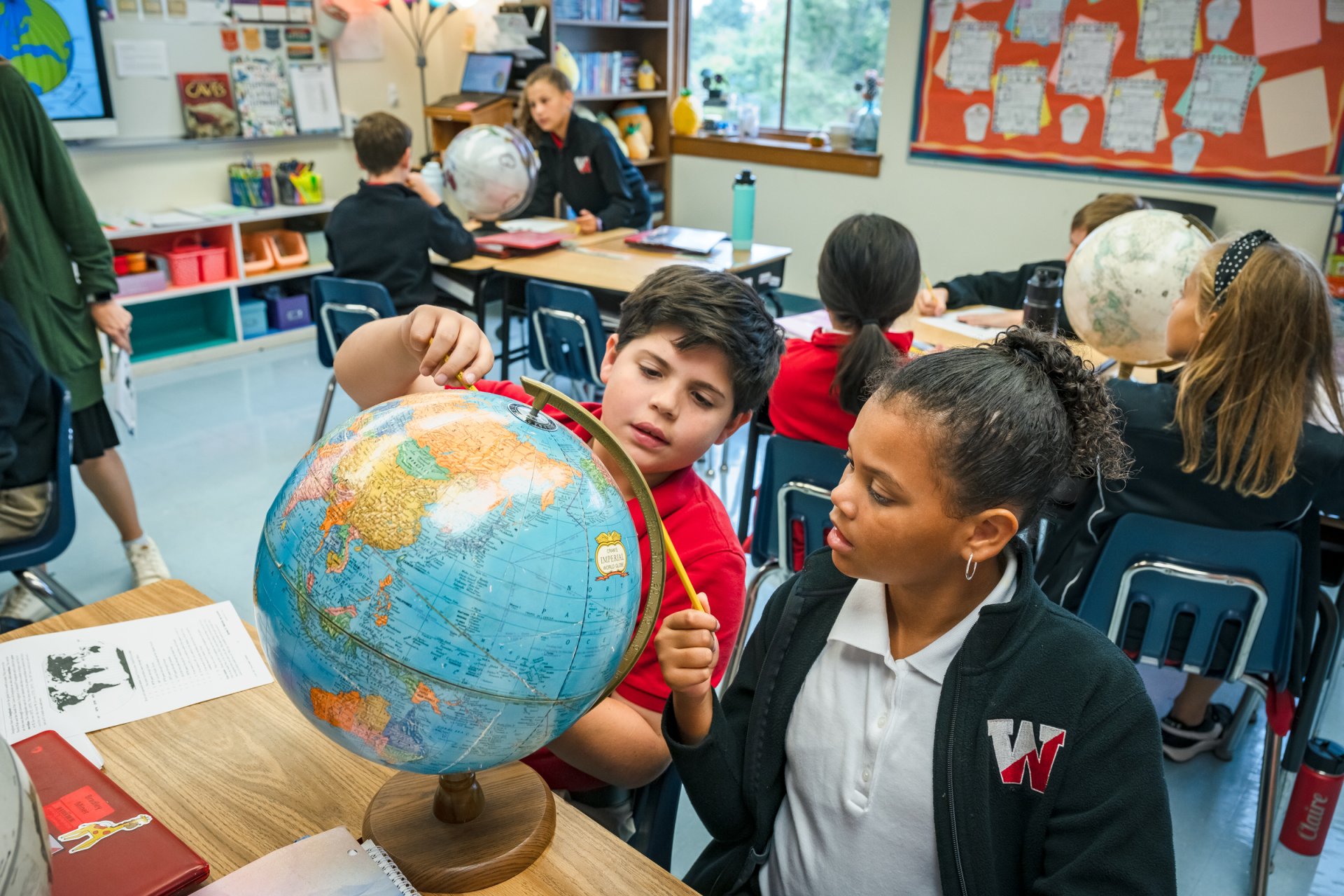
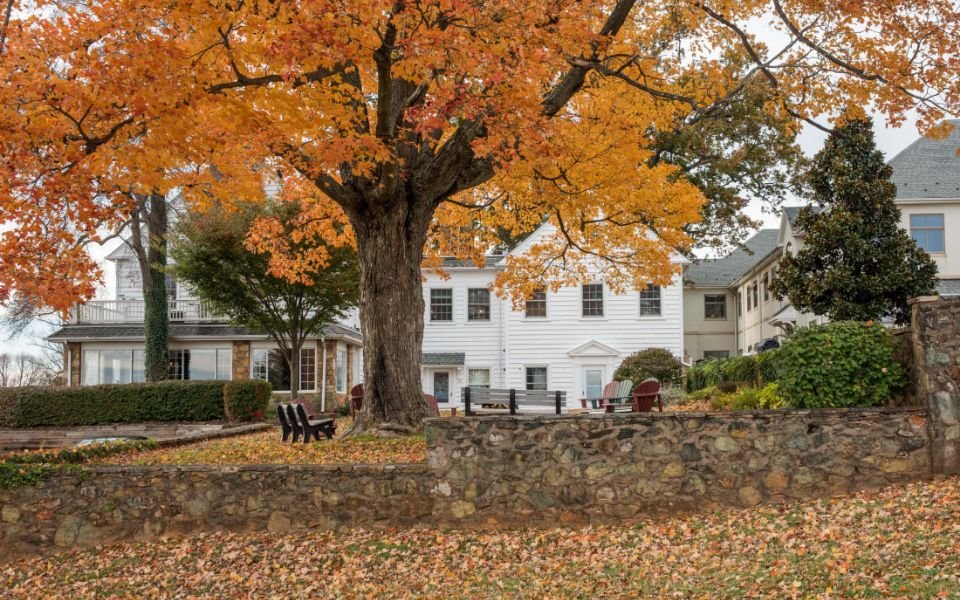
Schedule
A Tour
Experience the Wakefield community through a private campus tour. See students and classes in action, meet faculty and staff, and learn more about the program offerings at Wakefield.


